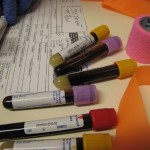Thousands of vials of blood sit in the Harris County crime lab’s storage refrigerators. This blood is from the thousands of alleged DWI offenders that have been forced to submit to blood testing at the time of their arrest. District Attorney Pat Lykos says the vials are taking up too much space and would like to see them gone.
 Lykos sent a letter to the state Attorney General this month asking what to do with the 13,000 vials of blood that sit undisturbed in the lab. While she hasn’t heard anything back from the AG, she’s certainly gotten an earful from local defense lawyers.
Lykos sent a letter to the state Attorney General this month asking what to do with the 13,000 vials of blood that sit undisturbed in the lab. While she hasn’t heard anything back from the AG, she’s certainly gotten an earful from local defense lawyers.
You see, if a defendant is tried and convicted of DWI, and their blood is stored, they should be able to access that evidence at a later date for retesting. But if that evidence is destroyed, any attempts at appealing their conviction could be shot.
Throughout the country in the past few years, including in Texas, we’ve seen the results of crime lab mishaps—shoddy work done by inattentive or careless staff. We’ve seen hundreds of cases overturned because of flawed evidence handling practices.
“If there was ever a time in Harris County history where no piece of biological evidence should be destroyed, it is now,” said one local defense lawyer. “I don’t think anyone should have a single bit of faith in any forensic testing that has been done in this county for the past decade.”
 The vials represent the increased number of forced blood draws instituted in 2008. Starting then, every DWI arrest resulted in a blood draw. Formerly, it was only in special cases like felony arrests or auto accidents that blood would be drawn.
The vials represent the increased number of forced blood draws instituted in 2008. Starting then, every DWI arrest resulted in a blood draw. Formerly, it was only in special cases like felony arrests or auto accidents that blood would be drawn.
The chain of evidence and how your evidence is tested and processed is crucial in ensuring your due process rights are protected.
Let’s say, for instance, someone in the lab is disenchanted with their job or simply doesn’t know better—they rush through their work and misread the test results or miscalibrate a machine—leaving you with a blood test that measures a blood alcohol content of .15, well over the legal limit.
You know you weren’t intoxicated, you had only had a single drink. But you are convicted on the basis of the evidence and sentenced accordingly. You want to appeal, to clear your name. But in the year that’s passed, the evidence has been destroyed. Now, there is no way to retest your blood or seek justice for the failed system that left you behind bars.
As of yet, Lykos hasn’t made any moves. She says she is awaiting direction from the state AG. According to the Houston Chronicle, she understands destroying the evidence could be a violation of a defendant’s rights. So, here’s hoping a few crowded refrigerators don’t cause her to change her mind.
If you are charged with DUI or any criminal offense in the state of Texas, we may be able to help. Contact our offices today to discuss your case.







